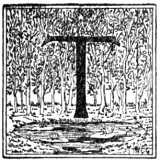
American Indian Fairy Tales, by Margaret Compton, [1907], at sacred-texts.com
 |
But there were also evil spirits in the land. These burrowed in the ground, gnawed at the roots of the loveliest flowers and destroyed them. They breathed upon the corn and blighted it. They listened whenever they heard men talking, and carried the news to those with whom it would make most mischief.
It is because of these wicked fairies that the Indian must be silent in the
woods and must not whisper confidences in the camp unless he is sure the spirits are fast asleep under the white blanket of the snow.
The Ojibways looked well after the interests of the good spirits. They shielded the flowers and stepped carefully aside when moss or flower was in their path. They brushed no moss from the trees, and they never snared the sunbeams, for on them thousands of fairies came down from the sky. When the chase was over they sat in the doorways of their wigwams smoking, and as they watched the blue circles drift and fade into the darkness of the evening, they listened to the voices of the fairies and the insects' hum and the thousand tiny noises that night always brings.
One night as they were listening they saw a bright light shining in the top of the tallest trees. It was a star brighter than all the others, and it seemed very near the earth. When they went close to the tree they found that it was really caught in the topmost branches.
The wise men of the tribe were summoned and for three nights they sat about the council fire, but they came to no conclusion about the beautiful star. At last
one of the young warriors went to them and told them that the truth had come to him in a dream.
While asleep the west wind had lifted the curtains of his wigwam and the light of the star fell full upon him. Suddenly a beautiful maiden stood at his side. She smiled upon him, and as he gazed speechless she told him that her home was in the star and that in wandering over all the earth she had seen no land so fair as the land of the Ojibways. Its flowers, its sweet-voiced birds, its rivers, its beautiful lakes, the mountains clothed in green, these had charmed her, and she wished to be no more a wanderer. If they would welcome her she would make her home among them, and she asked them to choose a place in which she might dwell.
The council were greatly pleased; but they could not agree upon what was best to offer the Star Maiden, so they decided to ask her to choose for herself.
She searched first among the flowers of the prairie. There she found the fairies’ ring, where the little spirits danced on moonlight nights. "Here," thought she, "I will rest." But as she swung herself backwards and forwards on the stem of a lovely blossom, she heard a terrible noise
and fled in great fear. A vast herd of buffaloes came and took possession of the fairies' ring, where they rolled over one another, and bellowed so they could be heard far on the trail. No gentle star maiden could choose such a resting-place.
She next sought the mountain rose. It was cool and pleasant, the moss was soft to her dainty feet, and she could talk to the spirits she loved, whose homes were in the stars. But the mountain was steep, and huge rocks hid from her view the nation that she loved.
She was almost in despair, when one day as she looked down from the edge of the wild rose leaf she saw a white flower with a heart of gold shining on the waters of the lake below her. As she looked a canoe steered by the young warrior who had told her wishes to his people, shot past, and his strong, brown hand brushed the edge of the flower.
"That is the home for me," she cried, and half-skipping, half-flying down the side of the mountain, she quickly made her way to the flower and hid herself in its bosom. There she could watch the stars as well as when she looked upward from the cup of the mountain rose; there she could talk to the star spirits, for they
bathed in the clear lake; and best of all, there she could watch the people whom she loved, for their canoes were always upon the water.